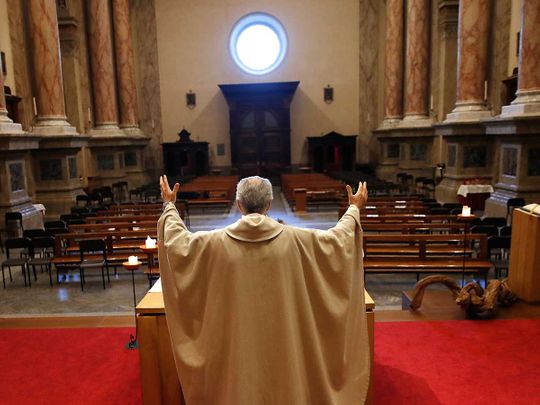
Madrid: The number of coronavirus deaths in Italy, Spain, France and Germany surpassed 30,000, with all four countries remaining on almost complete lockdown as leaders struggle to bring the outbreak under control.
Coronavirus deaths accelerated across the four European nations, which between them have almost 60 per cent of total fatalities and more than a third of the global tally of 1 million confirmed cases. That gives governments little leeway to ease lockdowns in a human and economic crisis that is straining continental unity.
While new infections slowed in Italy and intensive-care admissions declined in Spain and France, officials said it’s still too early to relax restrictions that have brought wide swathes of Europe to a halt. France’s death toll rose sharply on Thursday after data from some nursing homes were included for the first time.
In Germany, the number of coronavirus deaths and confirmed cases rose by more than the previous day on Friday, with total fatalities climbing past 1,000 in Europe’s third-worst outbreak. Chancellor Angela Merkel this week prolonged a lockdown until April 19 and urged Germans to avoid visiting relatives during the Easter holiday.
There’s no quick end in sight for suffering in Europe. Italian Prime Minister Giuseppe Conte is expected to unveil measures to provide liquidity for companies as early as Friday as he calls for jointly-issued European debt to aid his country’s finances.
Italy, the euro area’s third-biggest economy, has been under lockdown since early March, halting non-essential economic activity and banning movement within the country except for work, health or emergency reasons. The mobility limits are in effect until at least April 13.
Pace of outbreak slows
Spain’s Health Ministry on Thursday reported 950 deaths from the coronavirus over the latest 24-hour period, the most since the outbreak began. A shortage of beds in intensive-care units could ease after the number of new admissions declined for the second consecutive day.
The country, which is likely to prolong a lockdown until April 26, may have a candidate to become a coronavirus vaccine before the end of April, Science Minister Pedro Duque said in a news conference Thursday.
In France, a similar positive trend in new cases suggests that lockdowns are starting to slow the pace of the outbreak, though that provides only relative relief. An initial, partial count at French nursing homes added 884 deaths to 471 new hospital deaths reported Thursday.
“We’ve never had so many seriously ill patients in France,” Jerome Salomon, the head of France’s public health agency, said Thursday.
In Italy, the number of hospitalised patients rose by 137, the lowest increase in at least a month. Italy’s death toll reached 13,915, while Spain’s surpassed 10,000. France, which will likely extend its lockdown beyond April 15, has reported 5,387 deaths. Germany’s total was 1,107.
Overflow of dead bodies
The UK government has begun a search for cold-storage warehouses to handle a possible overflow of dead bodies, according to people familiar with the situation. The government has already converted the London Excel Centre, an exhibition space, into a temporary hospital.
Prime Minister Boris Johnson’s pledge to expand coronavirus testing is already falling behind schedule. His spokesman, James Slack, told reporters 10,412 tests were carried out on Tuesday and accepted the UK hasn’t been doing enough.
The economic impact is hitting home across Europe.
Spain reported more than 300,000 new jobless claims for March, the biggest monthly increase on record. Restrictions has put travel on hold, with Ryanair Holdings Plc reporting a 48 per cent drop in traffic and saying it would carry “minimal if any” passengers in April and May.
Germany warned it could face a deeper recession than during the financial crisis as the pandemic shuts down large parts of Europe’s biggest economy.








